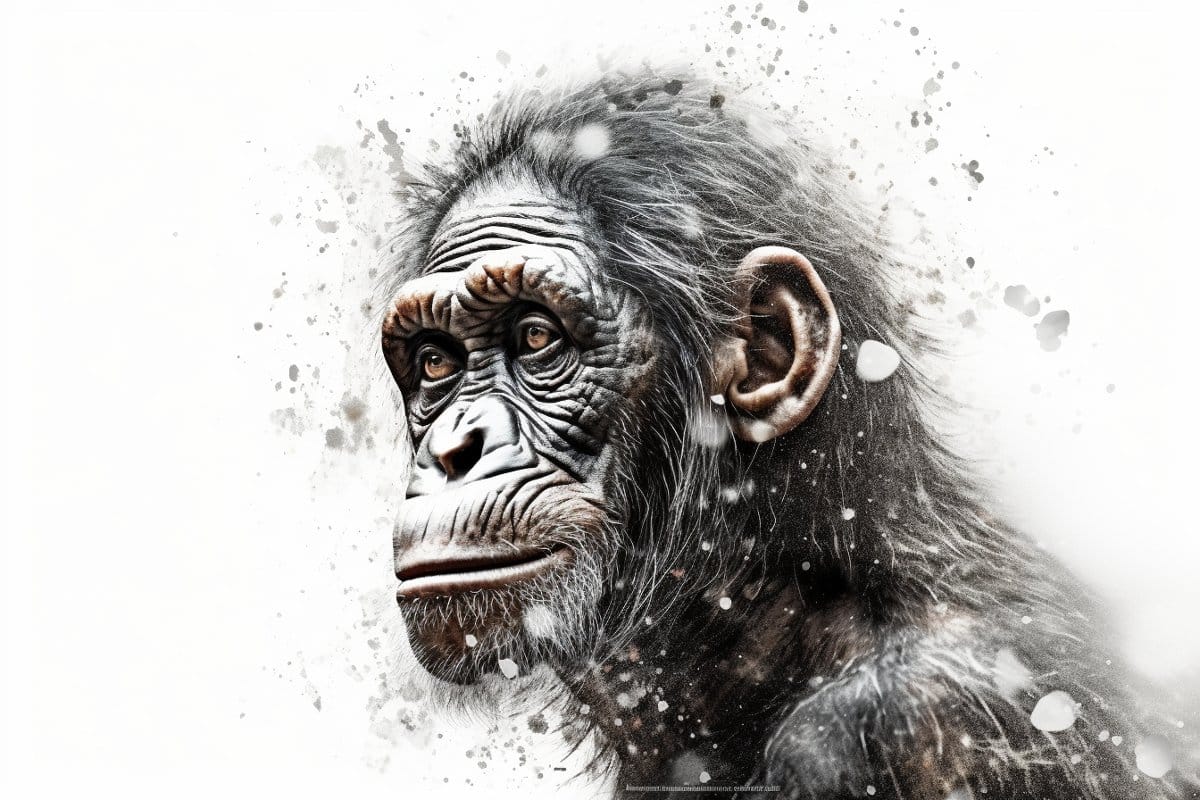What Apes Represent in Dreams
Aggression and Intimidation
Apes, particularly gorillas and chimpanzees, often appear in dreams as a representation of raw emotions, primal instincts, and unbridled aggression.
In dreams, apes may symbolize the aspects of ourselves that we try to suppress or hide from others, such as our darker impulses, fears, and anxieties.
When an ape appears in a dream, it can indicate that there are unresolved conflicts or pent-up emotions within us that need to be addressed and released.
The aggressive behavior exhibited by apes in dreams may suggest feelings of frustration, anger, or helplessness in waking life.
This symbolism is closely tied to the concept of the “shadow self,” a term coined by Carl Jung to describe the repressed aspects of our personality that we often deny or hide from others and ourselves.
Seeing an ape in a dream can be a call to acknowledge and confront these hidden emotions, rather than trying to suppress or ignore them.
This confrontation can lead to personal growth, self-awareness, and a deeper understanding of oneself and one’s place in the world.
The following are some possible scenarios involving apes in dreams:
- You see an ape charging towards you in a dream, indicating feelings of overwhelm or being attacked by your own emotions or anxieties.
- An ape is attacking another animal in the dream, representing internal conflicts or rivalries within yourself.
- You are an ape in the dream and feel a strong sense of power or freedom, symbolizing the need to tap into your inner strength or creative potential.
In terms of intimidation, apes can represent the fear of being overwhelmed or dominated by external forces or circumstances.
This fear may stem from past experiences, societal pressures, or unconscious anxieties that prevent us from asserting ourselves or standing up for our needs and boundaries.
The ape’s intimidating presence in a dream can serve as a reminder to confront and overcome these fears, rather than allowing them to control our lives.
Apes in dreams often symbolize aggression and intimidation, as they are known to be powerful and dominant animals in the wild. This interpretation is supported by research on dream analysis, which suggests that apes can represent a person’s feelings of being overwhelmed or threatened.
Apes in dreams often symbolize a range of emotions and experiences, depending on the context and content of the dream.
Aggression and Intimidation
Apes are known to be powerful and dominant animals in the wild, which is why they can represent aggression and intimidation in dreams.
This interpretation is supported by research on dream analysis, which suggests that apes can represent a person’s feelings of being overwhelmed or threatened.
Power and Control
In some cases, apes in dreams may symbolize power and control, as they are highly intelligent and social animals.
This could indicate that the dreamer is seeking to assert their authority or gain more control over a situation in their waking life.
Types of Apes
- Chimpanzees: In dreams, chimpanzees may represent curiosity and playfulness, as they are known for their intelligent and social nature.
- Gorillas: Gorillas in dreams may symbolize strength and protection, as they are powerful and territorial animals.
- Orangutans: Orangutans in dreams may represent independence and individuality, as they are solitary and intelligent animals.
Possible Meanings of Apes in Dreams
The possible meanings of apes in dreams can be broken down into several categories:
- Fear or anxiety: Apes may represent a sense of fear or anxiety in the dreamer’s life, such as feeling overwhelmed or threatened by a situation.
- Power struggle: Apes may symbolize a power struggle between two people or groups, indicating that the dreamer feels powerless or dominated in some way.
- Creativity and imagination: Apes can also represent creativity and imagination, as they are highly intelligent and social animals.
It’s worth noting that the meaning of apes in dreams can vary depending on the context and content of the dream, as well as the individual’s personal associations and experiences.
Conclusion
In conclusion, apes in dreams can represent a range of emotions and experiences, from aggression and intimidation to power and control.
The possible meanings of apes in dreams can be broken down into several categories, including fear or anxiety, power struggle, and creativity and imagination.
By considering the context and content of the dream, as well as the individual’s personal associations and experiences, we can gain a deeper understanding of what apes may symbolize in our dreams.
Personal Growth and Transformation
Evolving into One’s True Self
The journey towards personal growth and transformation is a deeply profound and multifaceted process that requires patience, self-awareness, and courage. It involves embracing change as an opportunity for self-discovery and evolution into one’s true self.
In this context, the dream about apes can serve as a powerful symbol for personal growth, encouraging individuals to confront their primal instincts, emotions, and desires. Apes in dreams often represent unconscious patterns, behaviors, or aspects of oneself that need to be acknowledged and integrated into one’s conscious awareness.
As we navigate the complexities of our subconscious mind, apes may emerge as a metaphor for embracing our wilder selves. This can manifest in various ways, such as feeling overwhelmed by our emotions or instincts, struggling with addictions, or experiencing conflicts between our rational and instinctual selves.
The dream about apes can be seen as an invitation to explore and understand these aspects of ourselves, rather than suppressing or denying them. By acknowledging and accepting our primal nature, we can liberate ourselves from the constraints of societal expectations and cultivate a deeper connection with our true selves.
This process of personal growth and transformation requires a willingness to confront and overcome our fears, insecurities, and limitations. It demands that we develop a greater sense of self-acceptance, self-compassion, and empathy for others.
Ultimately, the dream about apes serves as a reminder that personal growth is an ongoing journey, one that involves continuous learning, exploration, and evolution into our true selves. By embracing this process with courage and humility, we can unlock our full potential and become the best versions of ourselves.
Apes may also symbolize personal growth and transformation in dreams. According to some researchers at the University of California, San Diego, apes can represent a person’s desire for independence and autonomy. They may be seen as guides or teachers who help individuals navigate through challenging situations.
Personal growth and transformation are complex and multifaceted concepts that have been studied and explored by researchers, psychologists, and spiritual leaders for centuries. At its core, personal growth refers to the process of developing and improving oneself, leading to a greater sense of self-awareness, purpose, and fulfillment.
Transformation, on the other hand, is often seen as a more profound and transformative experience that can occur through significant events, challenges, or life-altering changes. This can lead to a complete overhaul of one’s perspective, values, and direction in life. Together, personal growth and transformation represent a powerful catalyst for positive change and self-improvement.
In the context of dreams, apes may symbolize personal growth and transformation due to their natural behaviors and characteristics. For example:
- Ape’s intelligence and problem-solving abilities can represent a person’s desire to overcome complex challenges and develop innovative solutions in waking life.
- The ape’s social nature, often seen as hierarchical and tribal, may symbolize a person’s need for community, belonging, or a sense of connection with others.
- Apes’ agility and adaptability can represent a person’s ability to navigate through changing circumstances and environments.
- The ape’s raw power and strength can symbolize a person’s need for assertiveness, confidence, or a sense of empowerment in the face of adversity.
As mentioned earlier, apes may also be seen as guides or teachers who help individuals navigate through challenging situations. This could manifest in dreams as:
- Ape’s wise and gentle guidance, offering words of encouragement and support during times of uncertainty.
- An ape’s willingness to teach and share knowledge, representing a person’s desire for self-improvement and personal growth.
It is worth noting that apes in dreams can also have negative connotations. For example:
- Ape’s aggressive behavior or dominance may symbolize feelings of anger, resentment, or frustration in waking life.
- An ape’s fear or avoidance of something may represent a person’s anxiety or phobia towards a particular situation or challenge.
Ultimately, the symbolism of apes in dreams is highly personal and can vary greatly from individual to individual. By exploring one’s own experiences, emotions, and associations with apes, individuals can gain a deeper understanding of their dreams and the transformative potential they hold.
Symbolism Across Cultures
Shared Meanings Beyond Western Culture
Culture plays a significant role in shaping our understanding of symbolism, with different societies attributing varying meanings to similar symbols. For instance, apes have different connotations in Western and non-Western cultures.
In Western culture, apes are often associated with the idea of primitive or savage behavior, reflecting a colonialist perspective that views them as “uncivilized” beings. However, this perception is not shared across all cultures.
For example, in some indigenous cultures of Africa and Asia, apes hold sacred status and are revered for their strength and agility. In these societies, apes are seen as powerful and wise creatures that embody spiritual and mystical qualities.
The Maasai people of East Africa have a rich tradition of associating apes with ancestral spirits and the divine. In their mythology, apes are believed to possess supernatural powers and are often depicted in stories and artwork as powerful and majestic beings.
In contrast, many Western cultures view apes as symbols of aggression, violence, or even comedy (as seen in the portrayal of apes in film and literature). This dichotomy highlights the complex and multifaceted nature of symbolism across cultures.
When considering dreams about apes, it is essential to acknowledge these diverse cultural perspectives. Dreaming about apes may symbolize different things depending on your personal experiences, cultural background, and individual associations with these animals.
In the context of Western culture, a dream about apes might represent feelings of fear, anxiety, or aggression. However, in other cultures, this dream could signify spiritual growth, strength, or connection to one’s ancestors.
The key takeaway is that symbolism is not fixed and universal; it varies significantly across cultures. By acknowledging and respecting these differences, we can deepen our understanding of the complex meanings behind apes in dreams and beyond.
In some African cultures, apes are revered for their intelligence and strength. A study by the Smithsonian Institution suggests that in these cultures, apes may symbolize wisdom, adaptability, and resilience.
The concept of symbolism across cultures reveals a rich tapestry of meanings and interpretations attributed to various objects, animals, and natural phenomena. In the realm of dreams, apes have been known to symbolize a range of qualities and attributes, reflecting their revered status in some African cultures.
As per the Smithsonian Institution’s study, apes may embody wisdom, adaptability, and resilience in these cultures. This suggests that the symbolic significance of apes is deeply rooted in their observed behavior and characteristics, which are highly valued in human societies.
The study also notes that the reverence for apes in African cultures is not limited to their physical strength or intelligence alone. Rather, it is a reflection of their ability to navigate and thrive in diverse environments, making them symbols of adaptability and resourcefulness.
In other cultural contexts, apes may symbolize different qualities altogether. For instance, in some indigenous cultures of South America, apes are associated with spiritual growth and transformation. They are believed to possess a deep understanding of the natural world and serve as messengers between humans and the spirit realm.
Interestingly, apes have also been linked to themes of identity, community, and belonging in various cultural traditions. In some African diasporic communities, for example, apes may represent a connection to ancestral heritage and a sense of shared experience across generations.
The symbolism of apes in dreams can be multifaceted and context-dependent, influenced by an individual’s personal experiences, emotions, and biases. While their meaning may vary from culture to culture, they often tap into fundamental human concerns such as resilience, adaptability, and spiritual growth.
Some possible interpretations of ape symbolism in dreams include:
- Coping with challenges: Apes may represent an individual’s ability to navigate complex situations and emerge stronger on the other side.
- Embracing change: As adaptable creatures, apes can symbolize a willingness to adapt to new circumstances and grow from experiences.
- Nurturing intuition: In some cultures, apes are associated with heightened senses of smell, sight, and hearing. They may represent an individual’s connection to their intuition and inner wisdom.
- Finding balance: Apes often inhabit diverse environments, making them symbols of equilibrium and balance in a rapidly changing world.
Ultimately, the symbolism of apes across cultures reflects our deep fascination with these intelligent, resourceful creatures. As we continue to learn from and admire them, their symbolic significance will evolve and adapt, providing new insights into human nature and experience.
- Teeth Crumbling Dream Meaning: What Does Teeth Crumbling Symbolize In Your Dream? - September 30, 2024
- Apes Dream Meaning: What Does It Symbolize When You Dream About Apes? - September 29, 2024
- Dad Dream Meaning: What Does Dreaming About Your Dad Mean? - September 28, 2024




